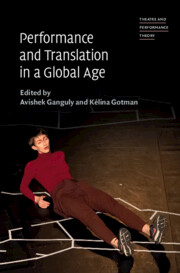Book contents
- Performance and Translation in a Global Age
- Theatre and Performance Theory
- Performance and Translation in a Global Age
- Copyright page
- Contents
- Figures
- Contributors
- Acknowledgements
- Introduction
- Part I Translation as Medium and Method
- Chapter 1 Medieval Soundings, Modern Movements
- Chapter 2 Transcolonial Performance
- Chapter 3 Experiments in Surtitling
- Chapter 4 Translating an Embodied Gaze
- Chapter 5 Performative Accents
- Part II Translation, Nation-state and Post-nationalism
- Part III ‘Translation at Large’: Dialogues on Ethics and Politics
- Works Cited
- Index
Chapter 5 - Performative Accents
Bilingualism, Postcolonialism and Francophonie in Michèle Lalonde’s Poster-poem ‘Speak White’
from Part I - Translation as Medium and Method
Published online by Cambridge University Press: 10 August 2023
- Performance and Translation in a Global Age
- Theatre and Performance Theory
- Performance and Translation in a Global Age
- Copyright page
- Contents
- Figures
- Contributors
- Acknowledgements
- Introduction
- Part I Translation as Medium and Method
- Chapter 1 Medieval Soundings, Modern Movements
- Chapter 2 Transcolonial Performance
- Chapter 3 Experiments in Surtitling
- Chapter 4 Translating an Embodied Gaze
- Chapter 5 Performative Accents
- Part II Translation, Nation-state and Post-nationalism
- Part III ‘Translation at Large’: Dialogues on Ethics and Politics
- Works Cited
- Index
Summary
This chapter thinks about ways that language is lived interstitially – between registers, accents, national histories, and personal travels – as something that (embarrassingly) always spills out or crops up when one is least ready for it to do so, revealing or mis-revealing a particular linguistic genealogy. Looking closely at Québécois poet Michèle Lalonde’s iconic 1967 poem-manifesto Speak White, and various recorded performances of this poem by speakers offering distinctive manners of accenting or pronouncing the bilingual (English–French) relations and agonisms enacted in the poem, this chapter further reflects autoethnographically or autocritically at ways the author’s own transnational and hybrid relation to these languages further helps to complicate national and international narratives. At once personal and political, historical, and critical, the chapter reflects on ways that language performatively offers an affective archive of one’s embodied and ancestral trajectories, and fails ever quite to account for how we experience the migrations and misalignments of our everyday.
- Type
- Chapter
- Information
- Performance and Translation in a Global Age , pp. 104 - 134Publisher: Cambridge University PressPrint publication year: 2023

